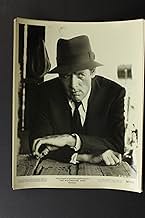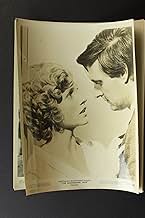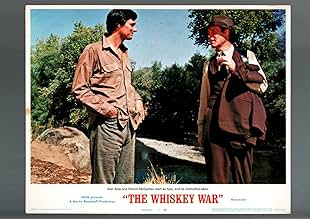Füge eine Handlung in deiner Sprache hinzuA federal agent attempts to make some real money before the alcohol ban is lifted so he sets his sights on the whiskey cache of an old army buddy.A federal agent attempts to make some real money before the alcohol ban is lifted so he sets his sights on the whiskey cache of an old army buddy.A federal agent attempts to make some real money before the alcohol ban is lifted so he sets his sights on the whiskey cache of an old army buddy.
- Boyd Caswell
- (as Richard Peabody)
- Young Wife
- (as Terry Garr)
Empfohlene Bewertungen
It's filled with thoroughly unlikable characters, with Widmark returning to his early, sociopathic roles, McGoohan utterly corrupt, and Alda very convincing as an unlikable moonshiner. Quine, who had been riding high in the 1950s, was near the end of his string, and was clearly trying to get some of that Bonnie-and-Clyde vibe, but everything is too clean for the back-end setting of hillbilly country just before the 1932 election. Still, it's a fine opportunity to see some classic supporting actors in brief bits, including Will Geer, Harry Carey Jr., and Max Showalter, and some players becoming well known inbits, including Teri Garr, John Schuck, and Tom Skerritt. Despite these small pleasures, it's a thoroughly and probably deliberately nasty movie. Elmore Leonard scripted from his own novel.
The movie is based in the last days before the repeal of the 18th Amendment of the U.S. Constitituion which made it a crime to import, buy or drink alcohol. A complete failure in regard to legislation. The principle of the movie revolved around a LARGE stash of 8 year old whiskey owned by Alan Alda's char acer that distributors would of paid twice their weight in gold for. What Mr. MacIntyre's missed was that the time and place were during the Great Depression in the Kentucky, the American South, which was triple-poor compared to the rest of the world. Alan Alda's character was not part of a family, but a member of a community who made whiskey to sell to the rest of the country because the soil of their farms could produce little else to keep them from going hungry. It was choice many people made during those times. The whiskey for Alda's character was a legacy from his father and his ticket out of the poor house along with his lady friend. Part of the dialog was leaving to go live in California, the eternal promise land even by today's standards.
Patrick McGooan's character was CROOKED, as in criminal, Federal officer looking to make himself rich from his old Army buddy "Son Martin's" whiskey. He was anything, but hard working and when confronted by the black man with the shotgun, even less so. Thus, his contact with Richard Widmark and his gang. When the gang found they no longer needed McGooan's character they turned on him. In turn Alda's neighbors turned on him, when the gang, posing as MORE Federal officers started raiding his neighbors stills and homes. They refused him service and credit at the local store among other things. I saw this flick as teenager and the storyline has remained with me for decades. It seemed that much of the story revolved around the old nursery rhyme about Chicky Licky who no one wanted to help make the bread, but they sure wanted to help eat it. The same thing is definitive in this movie, but the ending was beautiful in the destruction of the bad guys and the reconciliation of the neighbors. I'm surprised this movie isn't out on DVD or VHS.
Alda is miles from Hawkeye Pierce in this film. He's a young moonshiner who's got some of the finest product around, comparatively speaking. And in those last days before America came to its senses and repealed Prohibition, he's got a short window of opportunity to get rid of his stash before legal liquor goes on the market again.
Trouble is that two people want his product real bad. One is gangster Richard Widmark, back again in those villainous roles that first brought him stardom. The second is treasury agent Patrick McGoohan, one of those despised revenuers that the hillbilly folk don't like.
McGoohan is no Eliot Ness, in fact he's more typical of the treasury agents from back in the day, crooks themselves trying to take advantage of an unpopular law. Yet even with gangsters gunning for Alda, the hill folk won't give McGoohan the right time of day.
The Moonshine War was an entertaining film, nothing special about it, but no disgrace to anyone involved. Except for the ending which was a classic of its kind. I can't say more, but if for no other reason see this film to see how Mr. Widmark and cronies are dealt with.
Considering the times this film depicts, that is the closing days of Prohibition and in the depths of the Great Depression, it is also hard to take these characters too seriously, for after all they are all on the make in some way, which makes this so much fun to watch.
You don't give a damn who wins !!!!
Patrick McGoohan's character as a crooked G-Man is par for the course, and Richard Widmark's corrupt dentist with his little sexy bundle in tow and other hangers-on may not be your average Louisvillian, though I imagine he does need a fair amount of medicinal alcohol for his private use, especially around Derby Week !!! (After all, what's a Mint Julep without bourbon.)
Alan Alda is quite good as 'Son Martin', who is sitting on a fortune in moonshine, patiently waiting for repeal.
Add all the local color provided by a good supporting cast, and you have a watchable movie, though you do have all these Hollywood types trying to get by with bad Southern drawls and over-the-top acting.
One highlight is seeing a young Teri Garr strip naked at gunpoint,(at least I think it was her, since we had a brief rear view. Could have been a body double).
Best watched with a full jar !!!!
Wusstest du schon
- WissenswertesThe federal Volstead Act did not prohibit drinking alcohol. It prohibited manufacture, sale, transport, distribution and import/export. It was left to the states to make laws to prohibit possession and consumption. All the states did, but Nevada's was repealed on state constitutional grounds.
- Patzer(at around 1h 20 mins) Frank Long leaves payment for his room on the hotel registry. The top $1 bill is a modern "small size" Federal Reserve Note with a green seal. The first of such notes went into circulation in 1963, some 30 years after the movie's prohibition era, which ended in 1933. When small size US currency replaced "large size" currency in 1928, all $1 bills were silver certificates displaying dark blue seals and serial numbers.
- Zitate
Mr. Baylor: If'n the law needs upholdin' in these parts, Mr. Frank Long, I uphold it, *I* take care of it.
Frank Long: You all confiscatin' whisky, Mr. Baylor?
Mr. Baylor: Well, I reckon you might say so - a swig at a time. Royce, give this ol' Long boy a sample of our white lightenin', will ya?
[Frank takes a swig]
Mr. Baylor: Right good stuff, huh, Mr. Long? Ah, it'd be a cryin' shame to throw that out in the ground just because some titless old women figure a feller oughtin' to drink that, wouldn't it? I'm askin' you now, wouldn't it?
- VerbindungenFeatured in Shooting the Moonshine War (1970)
Top-Auswahl
- How long is The Moonshine War?Powered by Alexa
Details
- Erscheinungsdatum
- Herkunftsland
- Sprache
- Auch bekannt als
- The Moonshine War
- Drehorte
- Stockton, Kalifornien, USA(location shooting)
- Produktionsfirma
- Weitere beteiligte Unternehmen bei IMDbPro anzeigen
- Laufzeit1 Stunde 40 Minuten
- Sound-Mix
- Seitenverhältnis
- 2.35 : 1
Zu dieser Seite beitragen






































